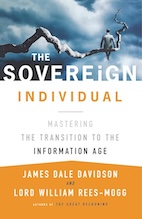Overall, “The Sovereign Individual” presents a vision of a future shaped by the digital revolution, where individuals have more power, autonomy, and opportunities than ever before, but also face new challenges and uncertainties.
“The future belongs to those who believe in the beauty of their dreams.” – Eleanor Roosevelt
“Innovation is the ability to see change as an opportunity – not a threat.” – Steve Jobs
“The best way to predict the future is to invent it.” – Alan Kay
“Change is the law of life. And those who look only to the past or present are certain to miss the future.” – John F. Kennedy
“The illiterate of the 21st century will not be those who cannot read and write, but those who cannot learn, unlearn, and relearn.” – Alvin Toffler
“It is not the strongest of the species that survives, nor the most intelligent, but the one most responsive to change.” – Charles Darwin
“The world as we have created it is a process of our thinking. It cannot be changed without changing our thinking.” – Albert Einstein
“In the new economy, information, education, and motivation are everything.” – Bill Clinton
“The advance of technology is based on making it fit in so that you don’t really even notice it, so it’s part of everyday life.” – Bill Gates
“We are all now connected by the Internet, like neurons in a giant brain.” – Stephen Hawking
“Digital technology allows us a much larger scope to tell stories that were pretty much the grounds of the literary media.” – George Lucas
“The digital revolution is far more significant than the invention of writing or even of printing.” – Douglas Engelbart
“Nations have come under the control of haters and fools.” – Carroll O’Connor
“True individual freedom cannot exist without economic security and independence.” – Franklin D. Roosevelt
“In the age of the Internet and the mobile phone, all revolutions are started on the net.” – Julian Assange
“Every once in a while, a new technology, an old problem, and a big idea turn into an innovation.” – Dean Kamen
“The digital revolution is almost as disruptive to the traditional media business as electricity was to the candle business.” – Ken Auletta
“We are moving toward a global economy. One way of approaching that is to pull the covers over your head. Another is to say: It may be more complicated – but that’s the world I am going to live in, I might as well be good at it.” – Phil Condit
“The new information technology… Internet and e-mail… have practically eliminated the physical costs of communications.” – Peter Drucker
“Privacy is dead, and social media hold the smoking gun.” – Pete Cashmore, Mashable CEO
“Learning is not attained by chance, it must be sought for with ardor and attended to with diligence.” – Abigail Adams

